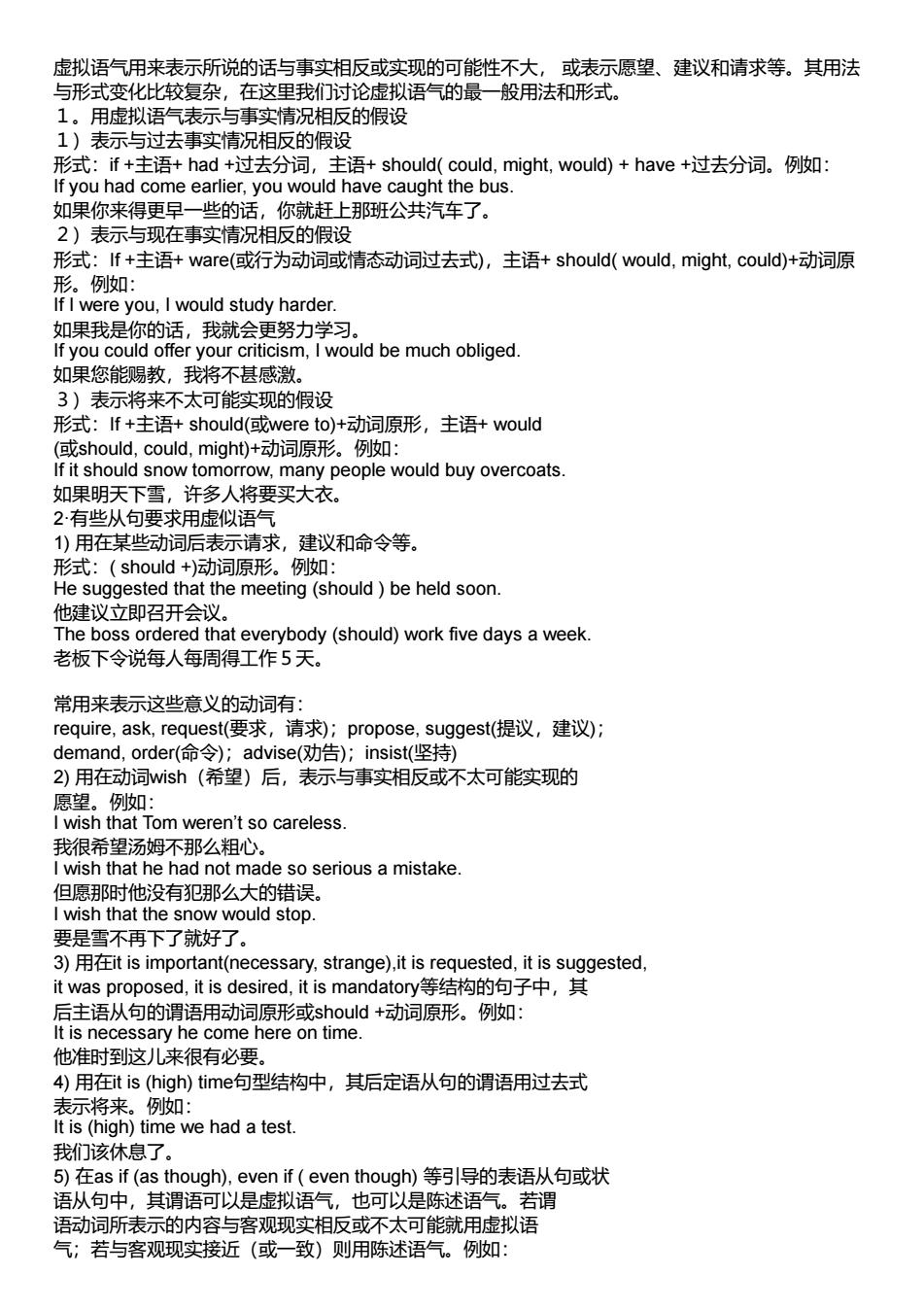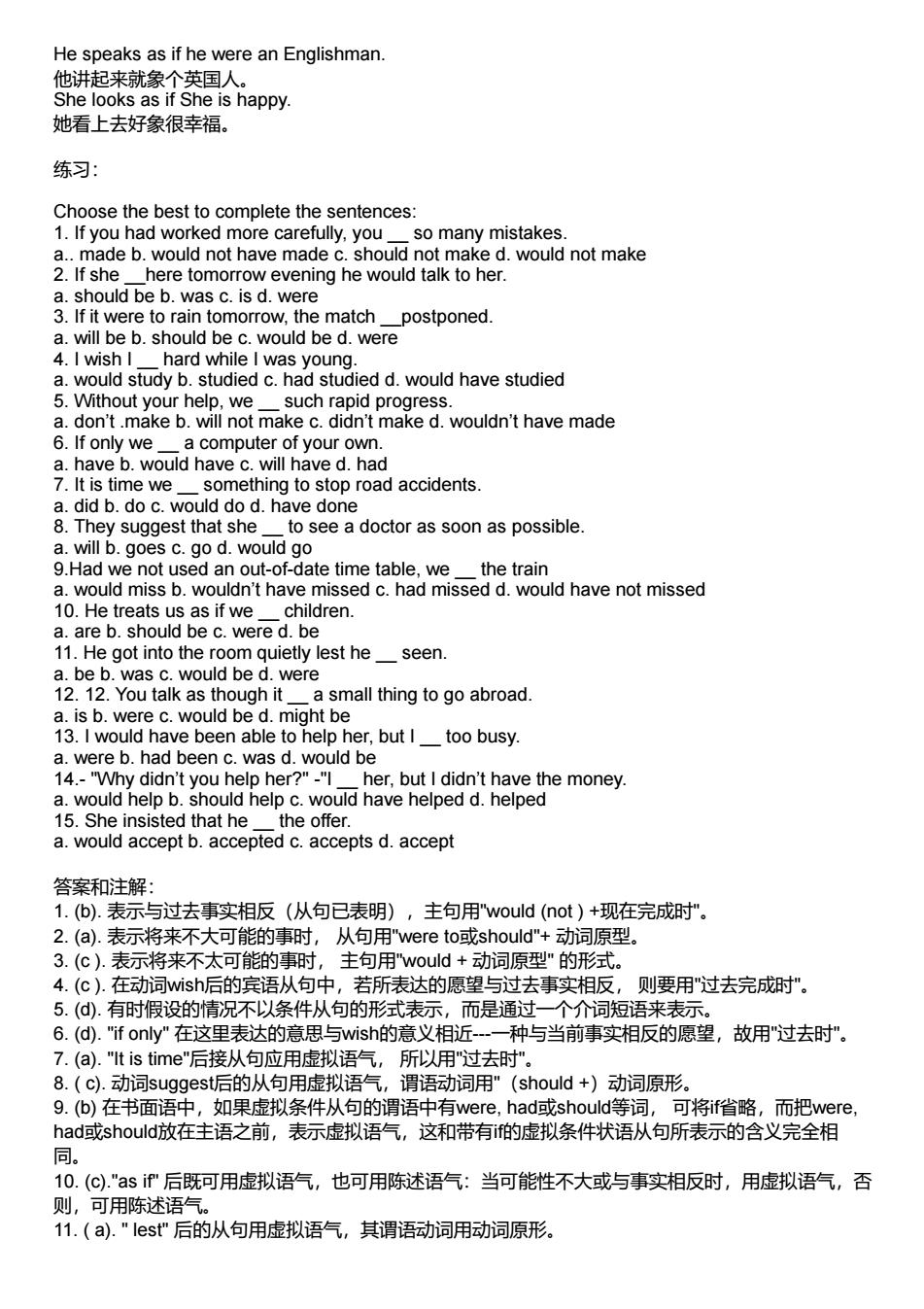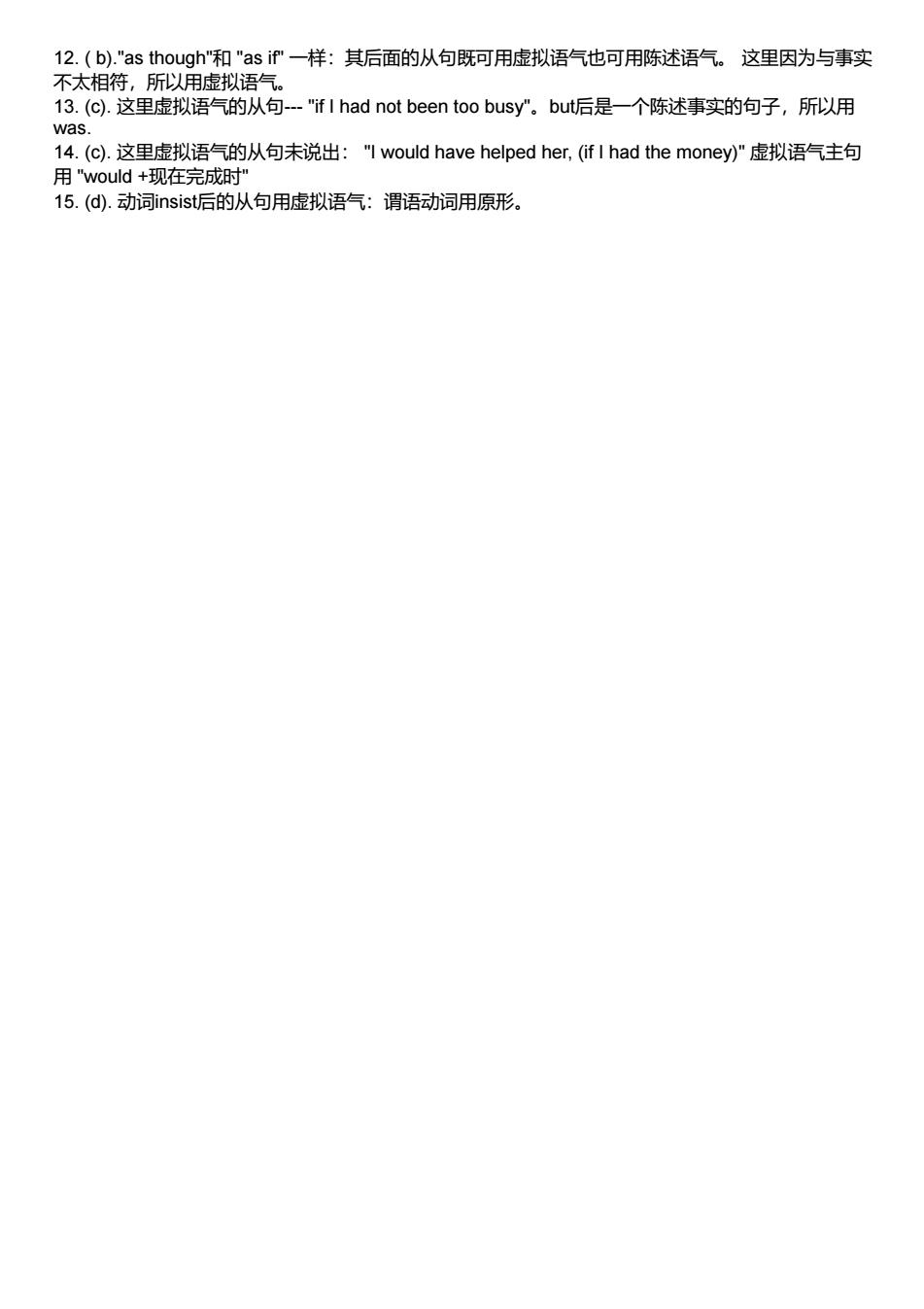
虚拟语气用来表示所说的话与事实相反或实现的可能性不大,或表示愿望、建议和请求等。其用法 与形式变化比较复杂,在这里我们时论虚拟语气的最一般用法和形式. 1 用虚拟语气表示与事实情况相反的假设 1)表示与过去事实情况相反的假设 形试:f+主语+hac +过去分词 主语+should(could,might,.would)+have+过去分词。例如: If you had come earlier,you would have caught the bus 如果你来得更早 些的话,你就赶上那班公共汽车了。 2)表示与现在事实情况相反的假设 形试:If+主语+ware(或行为动词或情态动词过去式),主语+should(would,might,.could)+动词原 果我的:,我就会力学 ould be much obliged 如果您能赐教,我将不甚感激 3)表示将来不太可能实现的假设 形式:If+主语should(或were to)+动词原形,主语+would 或should.could.miaht)+动原形列加: If it should snow to w.many p eople would buy overcoats 如果明天下雪,许多人将要买大衣 2·有些从句要求用虚似语气 1)用在某些动词后表示请求,建议和命令等。 形试:(should+)动词原形。例如: He suggested that the meetina (should be held soon 他建议立即召开会议。 The boss ordered that evervbody(should)work five days a week 老板下令说每人每周得工作5天」 堂用来表示文此音义的动司有 require,.ask,request(要求 请求);propose suggest((提议,建议) demand,order(命令);advise(劝告);insist(坚持) 2)用在动词wish(希望)后,表示与事实相反或不太可能实现的 园望。例如: I wish that Tom weren't so careless 我很希望汤姆不那么相心 I wish that he had not made so serious a mistake 但原那时他沿有犯那久大的错悍」 I wish that the snow would stop 要是雪不再下了就好 3)itis important(necessary.strange),it is requested. it is suggested. it was proposed,it is desired,it is mandatory等结构的句子中,其 后主语从句的谓语用动词原形或should+动词原形。例如: It is necessary he come here on time. 他准时到这儿来很有必要。 4)用在itis(high)time句型结构中,其后定语从句的谓语用过去式 we had a test 我们该休息了。 5)在asif(as though),even if(even though)等引导的表语从句或状 语从句中,其谓语可以是虚拟语气,也可以是陈述语气。若谓 语动词所表示的内容与客观现实相反或不太可能就用虚拟语 气:若与客观现实接近 (或
虚拟语气用来表示所说的话与事实相反或实现的可能性不大, 或表示愿望、建议和请求等。其用法 与形式变化比较复杂,在这里我们讨论虚拟语气的最一般用法和形式。 1。用虚拟语气表示与事实情况相反的假设 1)表示与过去事实情况相反的假设 形式:if +主语+ had +过去分词,主语+ should( could, might, would) + have +过去分词。例如: If you had come earlier, you would have caught the bus. 如果你来得更早一些的话,你就赶上那班公共汽车了。 2)表示与现在事实情况相反的假设 形式:If +主语+ ware(或行为动词或情态动词过去式),主语+ should( would, might, could)+动词原 形。例如: If I were you, I would study harder. 如果我是你的话,我就会更努力学习。 If you could offer your criticism, I would be much obliged. 如果您能赐教,我将不甚感激。 3)表示将来不太可能实现的假设 形式:If +主语+ should(或were to)+动词原形,主语+ would (或should, could, might)+动词原形。例如: If it should snow tomorrow, many people would buy overcoats. 如果明天下雪,许多人将要买大衣。 2·有些从句要求用虚似语气 1) 用在某些动词后表示请求,建议和命令等。 形式:( should +)动词原形。例如: He suggested that the meeting (should ) be held soon. 他建议立即召开会议。 The boss ordered that everybody (should) work five days a week. 老板下令说每人每周得工作5天。 常用来表示这些意义的动词有: require, ask, request(要求,请求);propose, suggest(提议,建议); demand, order(命令);advise(劝告);insist(坚持) 2) 用在动词wish(希望)后,表示与事实相反或不太可能实现的 愿望。例如: I wish that Tom weren’t so careless. 我很希望汤姆不那么粗心。 I wish that he had not made so serious a mistake. 但愿那时他没有犯那么大的错误。 I wish that the snow would stop. 要是雪不再下了就好了。 3) 用在it is important(necessary, strange),it is requested, it is suggested, it was proposed, it is desired, it is mandatory等结构的句子中,其 后主语从句的谓语用动词原形或should +动词原形。例如: It is necessary he come here on time. 他准时到这儿来很有必要。 4) 用在it is (high) time句型结构中,其后定语从句的谓语用过去式 表示将来。例如: It is (high) time we had a test. 我们该休息了。 5) 在as if (as though), even if ( even though) 等引导的表语从句或状 语从句中,其谓语可以是虚拟语气,也可以是陈述语气。若谓 语动词所表示的内容与客观现实相反或不太可能就用虚拟语 气;若与客观现实接近(或一致)则用陈述语气。例如:

He speaks as if he were an Englishman 他讲起来就象个英国人。 She looks as if She is happy. 她看上去好象很幸福。 练习: Choose the best to complete the sentences: 1.If you had worked more carefully,you so many mistakes made b.would not have made c.should not make d.would not make here tomorrow evening he would talk to her. 3.w ,S0. natch postponed wish I hard while l was vou a.would study b.studied c.had studied d.would have studied 5.Without your help,we such rapid progress. a.don't.make b.will not make c.didn't make d.wouldn't have made 6.If only we a computer of your own. a.have b.would have will have d.hac time we at n90 top road accidents ggest that she ve done a doctor as soon as possible will h ao es c ao d would ac 9.Had we not used an out of-date tim the trair a.would miss b.wouldn't have missed c.had missed d.would have not missed 10.He treats us as if we children He got into the room qu uietly lest he seen be d.were a small thing to go abroad ould hav able m her.but I too busy. e h had h c.was d.wo uld be her.but I didn't have the money a.would help b.should help c.would have helped d.helped 15.She insisted that he_ the offer a.would accept b.accepted c.accepts d.accept 答案和注解: 1.(b).表示与过去事实相反(从句已表明),主句用"woud(not)+现在完成时 2.(a).表示将来不大可能的事时,从句用"were to或should"+动词原型。 3.(c).表 将来 主句用"would 动词原型的形式 4.(c).在动词wish后的宾语从句中 若所表达的愿望与过去事实相反,则要用"过去完成时”。 5.(d).有时假设的情况不以条件从句的形式表示,而是通过 一个介词短语来表示。 6.(d.""if only""在这里表达的意思与wish的意义相近-一 一种与当前事实相反的愿望,故用"过去时。 7.(a)."It is time"后接从句应用虚拟语气, 所用时去时 8.(c).动词suggestF后的从句用虚拟语气 谓语动词用”(should+)动词原形 9.(b)在书面语中,如果虚拟条件从句的谓语中有were,had或should等词,可将i省略,而把were, had或should放在主语之前,表示虚拟语气,这和带有if的虚拟条件状语从句所表示的含义完全相 10.(c)."siP后既可用虚拟语气,也可用陈述语气:当可能性不大或与事实相反时,用虚拟语气,否 则,可用陈述语气 11.(a)."lest”后的从句用虚拟语气,其谓语动词用动词原形
He speaks as if he were an Englishman. 他讲起来就象个英国人。 She looks as if She is happy. 她看上去好象很幸福。 练习: Choose the best to complete the sentences: 1. If you had worked more carefully, you _ so many mistakes. a. made b. would not have made c. should not make d. would not make 2. If she _here tomorrow evening he would talk to her. a. should be b. was c. is d. were 3. If it were to rain tomorrow, the match _postponed. a. will be b. should be c. would be d. were 4. I wish I _ hard while I was young. a. would study b. studied c. had studied d. would have studied 5. Without your help, we _ such rapid progress. a. don’t .make b. will not make c. didn’t make d. wouldn’t have made 6. If only we _ a computer of your own. a. have b. would have c. will have d. had 7. It is time we _ something to stop road accidents. a. did b. do c. would do d. have done 8. They suggest that she _ to see a doctor as soon as possible. a. will b. goes c. go d. would go 9.Had we not used an out-of-date time table, we _ the train a. would miss b. wouldn’t have missed c. had missed d. would have not missed 10. He treats us as if we _ children. a. are b. should be c. were d. be 11. He got into the room quietly lest he _ seen. a. be b. was c. would be d. were 12. 12. You talk as though it _ a small thing to go abroad. a. is b. were c. would be d. might be 13. I would have been able to help her, but I _ too busy. a. were b. had been c. was d. would be 14.- "Why didn’t you help her?" -"I _ her, but I didn’t have the money. a. would help b. should help c. would have helped d. helped 15. She insisted that he _ the offer. a. would accept b. accepted c. accepts d. accept 答案和注解: 1. (b). 表示与过去事实相反(从句已表明),主句用"would (not ) +现在完成时"。 2. (a). 表示将来不大可能的事时, 从句用"were to或should"+ 动词原型。 3. (c ). 表示将来不太可能的事时, 主句用"would + 动词原型" 的形式。 4. (c ). 在动词wish后的宾语从句中,若所表达的愿望与过去事实相反, 则要用"过去完成时"。 5. (d). 有时假设的情况不以条件从句的形式表示,而是通过一个介词短语来表示。 6. (d). "if only" 在这里表达的意思与wish的意义相近-一种与当前事实相反的愿望,故用"过去时"。 7. (a). "It is time"后接从句应用虚拟语气, 所以用"过去时"。 8. ( c). 动词suggest后的从句用虚拟语气,谓语动词用"(should +)动词原形。 9. (b) 在书面语中,如果虚拟条件从句的谓语中有were, had或should等词, 可将if省略,而把were, had或should放在主语之前,表示虚拟语气,这和带有if的虚拟条件状语从句所表示的含义完全相 同。 10. (c)."as if" 后既可用虚拟语气,也可用陈述语气:当可能性不大或与事实相反时,用虚拟语气,否 则,可用陈述语气。 11. ( a). " lest" 后的从句用虚拟语气,其谓语动词用动词原形

12.(b)."as though"和"asif"一样:其后面的从句既可用虚拟语气也可用陈述语气。这里因为与事实 不太相符,所以用虚拟语气。 13.(c).这里虚拟语气的从句-"'if I had not been too busy'"。but后是一个陈述事实的句子,所以用 was. 14.(c).这里虚拟语气的从句未说出:"I would have helped her,(if I had the money)"虚拟语气主句 用"would+现在完成时” 15.(d).动词insist后的从句用虚拟语气:谓语动词用原形
12. ( b)."as though"和 "as if" 一样:其后面的从句既可用虚拟语气也可用陈述语气。 这里因为与事实 不太相符,所以用虚拟语气。 13. (c). 这里虚拟语气的从句- "if I had not been too busy"。but后是一个陈述事实的句子,所以用 was. 14. (c). 这里虚拟语气的从句未说出: "I would have helped her, (if I had the money)" 虚拟语气主句 用 "would +现在完成时" 15. (d). 动词insist后的从句用虚拟语气:谓语动词用原形